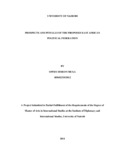| dc.description.abstract | Regional integration is a concept that has received considerable interest from
scholars particularly after the end of the Second World War. This attention has focused
on regional integration as a process, as an outcome of the process and as a sub discipline
of study within the larger academic area of International Relations.
To adequately respond to the changing dynamics in the international political
system, countries have increasingly sought to integrate economically and politically,
either to acquire greater military/ security/ defence / capacity or to reap from the benefits
of enlarged markets. In the process several regional integration arrangements have been
founded with varying degrees of success.
It is this phenomenon that this study investigated with specific reference to the
political integration in the East African Community. This research project dedicated itself
to investigating the prospects and pitfalls of the proposed East African Political
Federation. It analyzed the development of federations in other parts of the world,
examined the history and development of the East African Community and investigated
the opportunities and challenges that faced the proposed political federation of East
African states. The study further sought to establish the link between economic and
political integration and to investigate the extent the East African Community has
exploited the opportunities and addressed the challenges to the eventual attainment of the
political federation.
The study employed both primary and secondary data in its investigation. Primary
data was gathered mainly through interviews while secondary data was gained from
already published works that addressed the topic of concern. Consequently, content
analysis was employed to analyze the information. From the said analysis several
conclusions were drawn.
The study concluded that economic integration influenced political integration
through the Common Market that eased movements of people across national borders
thus working towards erosion of national prejudices. Benefits of economic integration
also influenced loyalties as more people favoured the larger polity that offered the
benefits over their individual states that then began to seem inadequate and limiting.
Lastly, economic integration would spill-over into political integration since a political
bureaucracy would be needed to ensure coordination and direction of the economically
integrated units.
The study also found out that the East African Community had made significant
strides towards ameliorating some of the challenges. The community has achieved
considerable progress under the economic integration platform and laid some foundation
for the political federation by addressing some of its pillars e.g. good governance,
election observation and defence/ security coordination.
On the other hand the study found out that the community still faces several
hurdles to the political federation, mainly the lack of citizen awareness and participation
and an emerging ideological rift pitting Kenya, Uganda and Rwanda on one side and
Tanzania and Burundi on the other. These are challenges with far-reaching implications
that must be addressed adequately if t he community is to achieve its goal of crafting a
political federation. | en_US |

